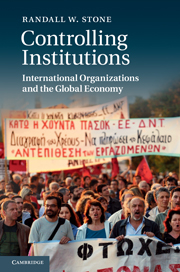Book contents
- Frontmatter
- Contents
- List of figures
- List of tables
- Preface
- List of abbreviations
- 1 Introduction: international organization and US power
- PART ONE THEORY
- PART TWO CASES
- 4 Informal governance in the IMF
- 5 The World Trade Organization
- 6 The European Union
- PART THREE HYPOTHESES
- Appendix: additional tables
- References
- Index
4 - Informal governance in the IMF
Published online by Cambridge University Press: 11 April 2011
- Frontmatter
- Contents
- List of figures
- List of tables
- Preface
- List of abbreviations
- 1 Introduction: international organization and US power
- PART ONE THEORY
- PART TWO CASES
- 4 Informal governance in the IMF
- 5 The World Trade Organization
- 6 The European Union
- PART THREE HYPOTHESES
- Appendix: additional tables
- References
- Index
Summary
The degree of the IMF's autonomy is controversial. The IMF was not designed to be the independent world central bank that Keynes envisaged; from the beginning, its members, most notably the United States, expressed a preference for a member-controlled organization rather than a supranational one. However, the Fund's management and staff have gradually gained autonomy from the shareholder countries represented on the Executive Board, and critics of the IMF fear that this autonomy goes too far. An alternative critique assumes that international organizations simply reflect the interests of a few powerful states, or of one. An impressive amount of evidence indicates that major shareholders are able to skew the distribution of IMF loans and to subsequently undermine the enforcement of conditionality. Similarly, countries that enjoy special relationships with major IMF shareholders may be able to avoid extensive conditionality when they borrow from the Fund. In almost all cases, the evidence indicates that the powerful shareholder that exercises influence over the IMF is the United States.
How does a country that holds only seventeen percent of the voting power in an organization exercise a controlling interest in its activities? The argument made here is that the aspects of the IMF's formal design that make it appear to be so autonomous, and that allow it to exercise considerable discretion in ordinary times, also make it extremely vulnerable to capture by a determined state that enjoys an organizational advantage.
- Type
- Chapter
- Information
- Controlling InstitutionsInternational Organizations and the Global Economy, pp. 51 - 79Publisher: Cambridge University PressPrint publication year: 2011



